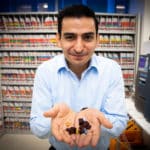Reading brain activity for better anaesthesia
More than 40 million people have major surgery in China each year. For every one of them the nature of consciousness is a very practical concern. Too low a dose of anaesthetic could see you wake up during the operation. Too high a dose could have long term health consequences.
Currently, the best monitoring devices can only monitor a suite of secondary indicators of consciousness. A Guangdong company has partnered with the University of Southern Queensland (USQ) with the aim of making anaesthesia easier and safer. They’re creating an intelligent device to directly measure the depth of unconsciousness and adjust the anaesthetic dose in real time.
Continue reading How deep is your sleep?









